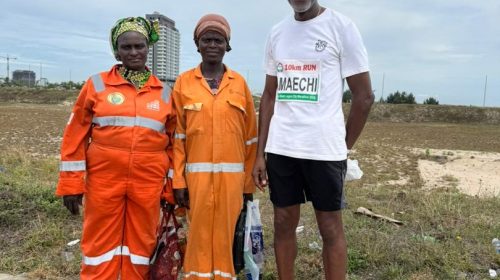Speech By CBN Gov. Godwin Emefiele At Bankers’ Committee Press Briefing On Introduction of RT200 In Abuja

Good afternoon, ladies, and gentlemen and welcome to the Central Bank of Nigeria (CBN). I have decided to personally lead this Press briefing today following the Bankers’ Committee Meeting, in order to give you updates on recent economic developments and to provide you with factual updates about the positive outcomes of the various intervention programs we introduced at the onset of COVID 19 and our new initiative in Nigeria’s Foreign Exchange Market. We also intend to update all about the decisions we have taken to ensure that we continue to strive to attain our mandates as set out in the CBN Act of 2007. In order to do so, let me first give you a brief background and context of our decisions.
- Prior to the onset of the COVID-19 pandemic, the Nigerian economy was on a positive growth trajectory. We had witnessed 12 consecutive quarters of positive growth, along with significant foreign capital inflows due to improved fundamentals of the economy.
- Unfortunately, the onset of the pandemic caused unprecedented social and economic consequences across the world. The rapid spread of COVID coupled with drastic measures taken by fiscal and monetary authorities to stabilize their respective economies has certainly changed the world as we know it.
- In Nigeria, its impact was evident through several channels. First, the virus constituted a challenge to public health given its contagious nature, and measures had to be taken to contain the spread of the virus. These included social distancing and movement restrictions, while efforts were taken to build the capacity of our health care institutions to respond adequately to the virus.
- On the economic front, we witnessed four (4) major discernible outcomes, namely:
- First, there was a sharp deceleration, and sometimes, complete stoppage, in global economic activities that significantly reduced the demand for, and price of crude oil, Nigeria’s main earner of US dollars. Indeed, prices fell by more than 70 percent, and as of 20 April 2020, the price of crude oil fell below zero dollar per barrel, as producers were forced to pay buyers for overwhelmed storage facilities.
- Second, given that no one knew the depth or duration of the pandemic, many foreign investors withdrew massive amount of funds from Emerging Economies, and reinvested them into safe haven assets, such as US Treasuries and gold. The Institute of International Finance (IIF) estimated that investors withdrew over US$100 billion in emerging market portfolio equity and roughly US$20 billion in emerging market portfolio bonds in the wake of the pandemic and
- Thirdly, diaspora remittances fell significantly. This is understandable because to the extent that COVID-19 led to significant job losses in many advanced economies, diaspora remittances also suffered commensurate reductions in inflows into Nigeria. All these factors jointly explain the heightened pressures on the currencies of major emerging market countries, including Nigeria.
- The final challenge we faced was major disruptions in global supply chains as countries sought to ensure that they had sufficient essential materials for their local market relative to their export market.
We witnessed countries like India, Vietnam and China put in place restriction on exports of food and drug items.
- Expectedly, these difficulties led to a contraction of the GDP and an uptick in inflation in 2020, with the inflation exacerbated by the increase in VAT rate, exchange rate adjustment and seasonal food supply shocks due to the onset of the farming season and other structural bottlenecks.
- Faced with these challenges, the Central Bank of Nigeria had to contend with balancing the need to increase spending to support the economy, with additional measures to prevent an undue spike in inflation and heightened pressure on our exchange rate. After careful analysis, we decided to support growth by taking unprecedented measures to prevent the economy from going into a tailspin. Our first objective was to restore stability to the economy by providing assistance to individual households, SMEs and businesses that had been severely affected by the pandemic, as well as by the lockdown measures. Some of the measures we took include:
- A 1-year extension of the moratorium on principal repayments for CBN intervention facilities.
- Reduction in the Monetary Policy Rate by 100 basis points from 12.5% to 11.5%.
- Reduction of the interest rate on CBN intervention loans from 9 to 5 percent.
- Creation of NGN300 billion Targeted Credit Facility (TCF) for affected households and small and medium enterprises through the NIRSAL Microfinance Bank.
- Creation of a NGN100 billion intervention fund in loans to pharmaceutical companies and healthcare practitioners intending to expand and strengthen the capacity of our healthcare institutions.
- Creation of a research fund, which is designed to support the development of vaccines in Nigeria.
- A N1 trillion facility in loans to boost local manufacturing and production across critical sectors.
- Introduction of policies and programmes to boost diaspora remittances.
- Ladies and gentlemen, to date the CBN, working with our DMBs and participating financial institutions has granted over N3 trillion in intervention loans that have undoubtedly been one of the critical ingredients for our economic recovery and employment generation. Specifically, under the Anchor Borrowers Programme, we have disbursed N948 billion to 4,478,381 smallholder farmers who cultivated 5.2 million hectares of farmland across the country, thereby creating 12.5 million direct and indirect jobs.
- Under our Targeted Credit Facility, which was meant to help households and businesses that suffered significant losses during the pandemic, we have disbursed N368.79 billion to 778,000 beneficiaries comprising 648,052 households, and about 130,000 SMEs. We have also disbursed N1.452 trillion to 337 Large real sector projects in agriculture, manufacturing, services, and mining under our Real Sector Support Facility. In healthcare, 122 major healthcare projects have been funded to the tune of N115.36 billion. These healthcare interventions went to 31 pharmaceutical and 91 hospital projects. This intervention helped to support acquisition of 59 Magnetic Resonance Imaging (MRI) scanners, 42 Computer Tomography (CT) scanners, and 4 Oncology screening machines.
- For the AGSMEIS programme, which caters for SMEs in the agribusiness space, a total of N134.63 billion has been released to 37,571 SME projects of which 67 percent were directly in agriculture-related projects, 22.5 percent were in services, while the balance were in fashion, IT, and related sub-sectors. Under the Nigeria Electricity Stabilization Facility, a total of N229 billion has been disbursed to 9 DisCos to help cover their financial obligations to upstream market participants. These interventions have helped to significantly improve liquidity in their ecosystem and increase electricity generation from 4,000 MW in 2020 to over 5,000 MW as of September 2021. The Bank has also released N47.83 billion to 10 DisCos under the National Mass Metering Programme for the procurement of 858,026 electricity meters. Because of these disbursements, the revenue collection for DisCos increased significantly to over N69 billion as of December 2021.
- It is important that I went through these numbers painstakingly to show that the problems we face in this country do have solutions as long as we work objectively to understand them and dispassionately to solve them. It is obvious from the foregoing that the impact of these measures helped the country make the fastest recovery from recession ever recorded and changed the trajectory of inflation to an 8-month downward spiral. These policies and measures also led to a significant improvement in diaspora inflow from an average of US$6 million per week in December 2020 to an average of over US$100 million per week by January 2022.
- Ladies and gentlemen, with these results and having embarked on this for 2 years, the CBN would be reviewing these intervention programs going forward to ensure that they continue to achieve the desired results. Indeed, the lessons we have learnt from this crisis have been invaluable in helping us with serious introspection with a view to finding long-lasting and homegrown solutions to these perennial problems. Although interest rates on our various intervention facilities were expected to revert to 9 percent effective March 1, 2022, we are announcing that the rates would remain at 5 percent for another year in view of the promising trajectory we have established in economic growth and job creation. In effect, the concessionary interest rate of 5 percent on our intervention facilities would now be extended until March 1, 2023.
- As regards the FOREX markets for example, on the inadequacy of FX supply and constant pressure on the exchange rate, I believe that the lessons we have learnt from our policies on remittances can be applied in improving some aspects of FX inflow into the country. As we know, there are four major sources of FX inflow into Nigeria. These are:
- Proceeds from oil exports
- Proceeds from non-oil exports
- Diaspora remittances, and
- Foreign Direct/Portfolio Investments.
- As I have explained above, all these sources were adversely affected by COVID-19. In addition, most of them are unreliable sources that are perennially prone to exogenous vicissitudes of global economic developments. For example, we have all been witnesses to the ever-changing fortunes of oil-exporting countries. Even those that have been reputed to manage their oil proceeds well also suffer from major shocks once oil prices plummet. In order to avoid these sudden adjustments to our economic life, we need to focus on strategies that can help us earn more stable and sustainable inflows of foreign exchange. We would need to follow the best practices of other countries and ensure that we protect ourselves a little bit from factors that are beyond our immediate control.
- After careful consideration of the available options and wide consultation with the Banking Community, the CBN is, effective immediately, announcing the Bankers’ Committee “RT200 FX Programme”, which stands for the “Race to US$200 billion in FX Repatriation”. The RT200 FX Programme is a set of policies, plans and programmes for non-oil exports that will enable us attain our lofty yet attainable goal of US$200 billion in FX repatriation, exclusively from non-oil exports, over the next 3-5 years.
- The RT200 Programme will have the following five (5) key anchors:
- Value-Adding Exports Facility
- Non-Oil Commodities Expansion Facility
- Non-Oil FX Rebate Scheme
- Dedicated Non-Oil Export Terminal
- Biannual Non-Oil Export Summit
- Let me briefly describe each of these anchors. The Value-Adding Export Facility will provide concessionary and long-term funding for businesspeople who are interested in expanding existing plants or building brand new ones for the sole purpose of adding significant value to our non-oil commodities before exporting same.
This is important because the export of primary unprocessed commodities does not yield much in foreign exchange. In Nigeria today, we produce about 770,000 metric tonnes of Sesame, Cashew and Cocoa. Of this number, about 12,000 metric tonnes are consumed locally and 758,000 metric tonnes are exported. The unfortunate thing though is that out of the 758,000 metric tonnes that is exported annually, only 16.8 percent is processed. The rest are exported as raw sesame, raw cashew, and raw cocoa, thereby giving Nigerian farmers an infinitesimal part of the value chain in these products. For example, the global chocolate industry is valued at about US$130 billion. Of this amount, Cote D’Ivoire, Ghana and Nigeria account for more than 72 percent of global cocoa exports.
- Yet, because we mainly export raw cocoa beans, Cote D’Ivoire gets US$3.6 billion annually, Ghana generates US$1.9 billion annually and Nigeria gets about US$804 million per year from an industry that is worth over US$130 billion. In contrast to West African countries, Belgium accounted for 11 percent of global chocolate exports in 2019, at a value of US$3.16 billion. Similarly, Germany’s chocolate exports were worth US$5.14 billion in the same year. These numbers are the same for other commodities as well.
- Therefore, given these alarming disparities between exporters of raw commodities and exporters of semi-finished or finished products, we believe that the Value-Adding Export Facility is a first step to getting back some of these foreign exchange that we rightly deserve. Indeed, we expect that this facility will also accommodate the demand of our youth population who are already adding value in using e-commerce and online methods for the provision and export of software, financial services, financial technology, Nigerian fashion and attires, and the likes. As long as these exports are captured with Form NXP and the FX proceeds are repatriated and verifiable, we will accommodate such businesses under this facility.
- The second Facility we announced is the Non-Oil Commodities Expansion Facility. This facility will also be a concessionary facility designed to significantly boost local production of exportable commodities. This facility will be designed to ensure that expanded and new factories that are financed by the Value-Adding Facility are not starved of inputs of raw commodities in their production cycle. A massive boost in the production of such commodities will also help dampen/moderate the prices of these commodities so that the expected increase in demand for them does not become a pressure point for aggregate prices in the market.
- In order to maximize the potentials and impact of this facility, we would replicate what other successful export-based economies have done by first prioritizing and targeting certain commodities. We would create a geographic prioritization of crops across the country to achieve production efficiencies through the development of special areas that will cater to specific commodities. Since sustainable foreign exchange earnings are dependent on national competitive advantage, a prioritization framework based on crops which Nigeria is best suited to produce will be essential.
- Today, we are also announcing the introduction of the Non-Oil FX Rebate Scheme, a special local currency rebate scheme for non-oil exporters of semi finished and finished produce who show verifiable evidence of exports proceeds repatriation sold directly into the I & E window to boost liquidity in the market. Analogous to the Naira4Dollar Scheme, which has helped boost remittances from only $6 million per week to over $100 million per week, we shall establish the modalities for granting a rebate for each dollar that non-oil exports proceeds that an exporter sells into the market, for the benefit of other FX users and not for funding its own operations. Although this rebate programe is with immediate effect, the detailed guideline of this scheme will be communicated next week. Our plan is to graduate the percentage of the rebate depending on the level of value addition into the product being exported.
- In recognition of the perennial problems of port congestion cited by exporters as a major impediment to improved operations and foreign exchange earnings, we have designed a third anchor of the RT200 Programme, which is the construction/establishment of a Dedicated Non-Oil Export Terminal. According to the African Centre for Supply Chain Practitioners, Nigeria loses about US$14.2 billion annually due to congestion at our ports. Paraphrasing from an article by the Financial Times in December 2020, the congestion has become so bad that while it costs US$3,500 to ship a 40-feet container from China to Lagos, which is a distance of 22,000 kilometers, it costs US$4,000 to move the same container from the port to mainland Lagos, a distance of only 12 kilometres. During our stakeholder engagements with various segments of exporters, we heard several heartbreaking accounts of how containers spent several months in the ports just waiting to be shipped, resulting in loss of perishable goods or well-established foreign customers.
- If we are to reach our goal of US$200 billion in non-oil exports, then we can neither ignore nor wish away this problem. We must confront it head-on and provide a solution. That is why we are today throwing a challenge to all State Governments that have existing ports and are willing to partner with the Bankers Committee to establish not only a dedicated export terminal but also the entire ecosystem of world-class infrastructure needed for non-oil exports. Over the next three months, the Bankers Committee will be collecting and analyzing detailed proposals from interested State Governments in order to decide which one we can partner with. The Bankers Committee will be arranging a significant part of the financing that will be needed for this port while the selected State Government will have responsibilities that will be spelt out in due course.
- We believe that this dedicated port will be capable of creating over 100,000 direct and indirect jobs and would provide a huge boost to our quest for significant improvement in non-oil export earnings in Nigeria. Let me emphasize that under this arrangement, loans to companies wishing to expand or build new plants that will generate verifiable export proceeds for the economy shall remain at 5 percent per annum for 10 years loans inclusive of 2 years moratorium.
- In recognition of the lessons we have learnt from our rounds of consultation with non-oil exporters, we believe that a more formal, predetermined and regular forum will be necessary to discuss the issues, challenges and opportunities in this segment of the economy. That is why today we are announcing the introduction of a Biannual Non-Oil Export Summit, the first of which would be organized during the first week of April 2022. This Summit will bring together all the relevant stakeholders in the export business including bankers, customs officials, the Nigerian Ports Authority, the Nigerian Export Promotion Council, clearing agents, cargo airlines, shipping lines, logistics companies, insurance practitioners, etc. This gathering will be one where for every complain, problem, issue, challenge or difficulty that is presented or identified, there will be one or several agencies or practitioners that can articulate options for solving that problem. I believe that the ideas harnessed from such summits would be invaluable in helping us reach our ultimate goal of US$200 billion in non-oil exports per annum.
- Ladies and gentlemen, I am mindful that this goal itself may appear unattainable to some. But I am resolute and determined that we can achieve it. Many countries that are much less endowed than Nigeria are doing it. Consider for example that agriculture exports alone from the Netherlands was about US$120 billion last year. Yet, Netherlands has a land mass of about 42,000 square kilometers, which is much smaller that the land mass of Niger State alone, at over 76,000 square kilometers.
- In closing, let me note very importantly that the RT200 Programme is not intended to be a silver bullet to all our problems in the export segment of the economy. Rather it is a first step meant to ensure that the CBN is better able to carry out its mandate in an effective and efficient manner, which guarantees preservation of our scarce commonwealth, and the stability of our national currency, the Naira. It is only by boosting productive and earning capacity of this economy that we can truly preserve the long-term value of our currency, as well as the stability of our exchange rate.
- I thank you all for listening.
Godwin I. Emefiele, CON
Governor,
Central Bank of Nigeria
10 February 2022







Leave a Reply